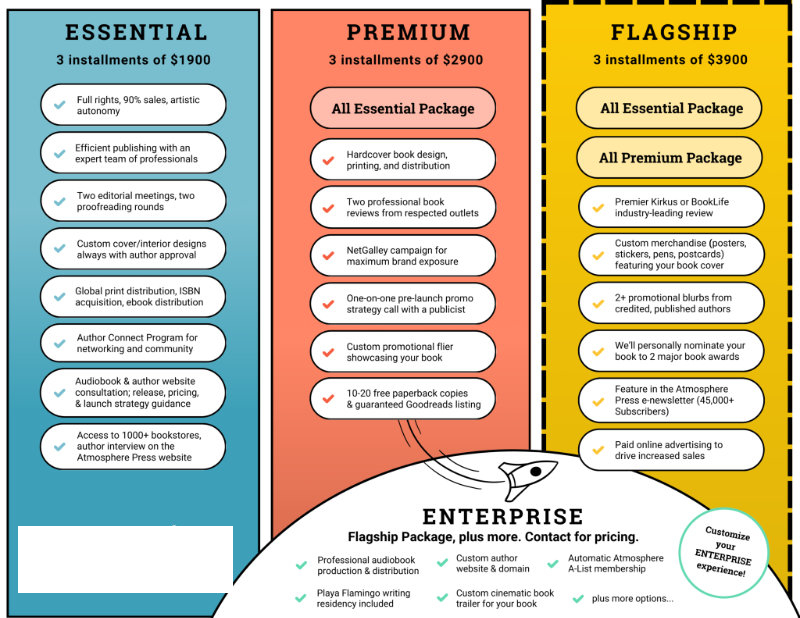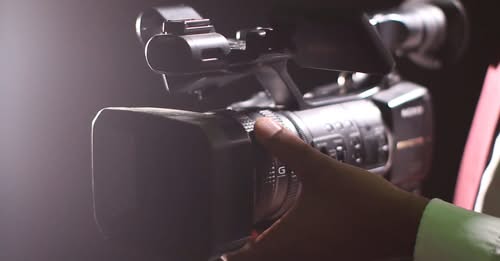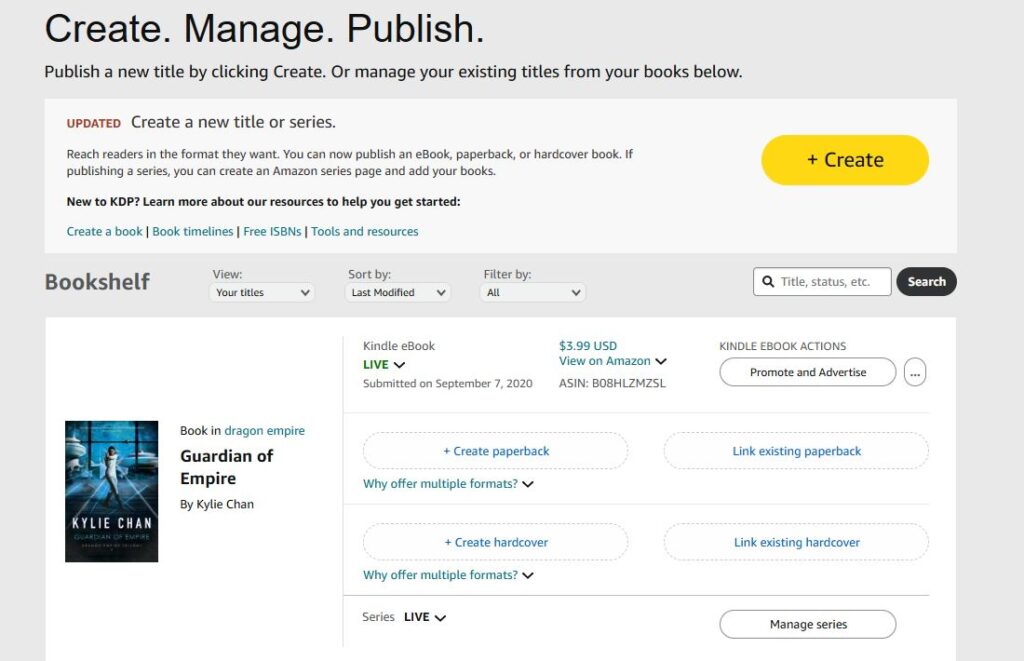How to Identify a Vanity Publisher
And what it's really like to be traditionally published- What a Vanity Publisher Looks Like
- What Will Happen If you Vanity Publish
- The Film Rights Scam
- The Genuine Traditional Publishing Process
- How Self-Publishing is Different

This is from a company that claims NOT to be a vanity publisher. It 100% is. The premium package costs $8,700 and you receive, at most 20 paperbacks. That’s a cost of $435 per copy.
Vanity publishers often advertise themselves on the web as ‘looking for submissions’ and offer a service that will publish your book. This is what they look like:
- Their website is either ‘We’re really legit and been around forever’ or ‘ACT NOW TO PUBLISH YOUR BOOK QUICK QUICK NOW!’ Some of them actively describe what a vanity publisher is, then place themselves as ‘cooperative’ or ‘partnership’ or ‘hybrid’ publishers. Anyone using any of these terms is almost guaranteed to be a vanity press as well.
- When you submit to them, they’ll respond quickly and tell you everything you want to hear. They love your book. It’s unique, beautifully written, a real page-turner, and outstanding in its genre. It’s a guaranteed best-seller.
- They do this by putting your synopsis into ChatGPT and telling the AI to write a glowing review based on your own synopsis. It sounds like they’ve read your book and liked it. They’re lying.
- They quickly – like two days quickly – offer you a traditional publishing contract. They claim that it’s definitely a traditional publishing deal, with royalties and everything. There is the fact that you pay them the advance, not the other way around, which should immediately ring alarm bells.
- They claim to do all the editing, cover design, marketing and promotion for you. They will provide you with an ISBN, Library of Congress registration, Copyright registration (which is so important with something this valuable), random merch from Vistaprint and a dedicated liaison person to guide you through your journey to fame.
- They may tell you that your work is so good that you need to be careful, because anyone could steal it, and publish it, and steal your fortune! The vanity publisher will register your copyright for you so you are the one that will be making millions from this masterwork instead of the hypothetical copyright thief.
- They’re basically telling you what you want to hear. Real publishers and agents aren’t terribly enthusiastic because they don’t want to get your hopes up too much.
- The Vanity Press clinches it by telling you how much it will cost you. It can start at US$3,000 and go up to US$100,000 depending on how desperate they think you are. If you tell them that you can’t afford their package, they will quickly drop the price or offer payment terms. They just want to have you hooked.
- If you sign with them, you hand them complete control and ownership and everything. They have final say on the cover and contents. You have no recourse if they change anything in your manuscript. They will own the rights so you can’t do anything with it yourself – including a media deal.
- The easiest way to spot a vanity publisher is if it’s Austin Macauley, who pay extra to have their listing at the top of Google. If you search for another publisher, Austin Macauley will have themselves come back as the top link.
Any company that has a base rate of $3,000 (up to $10,000) to publish your book and only provides a few dozen ‘author copies’ is almost guaranteed to be a vanity publisher. A traditional publisher will never charge you money.

If you pay the vanity publisher the money and give them your book:
- They do fulfil the contract. They edit (if they agreed to, sometimes they don’t), provide a shonky cover that’s probably a copy of every other cover in the genre, and publish it on platforms like Kindle Direct.
- Often the paperback isn’t published on a distributor like Ingram, it’s just printed at a print shop in China and sent to you.
- When your book doesn’t sell (because they don’t want it to) they will aggressively upsell you to a more expensive marketing package to give your masterwork the publicity it deserves.
- They will tell you with just a little more funds, another small contribution from you, an upgrade on your marketing… your book will definitely sell more copies.
- Rinse and repeat until you’ve invested thousands of dollars and your book is still not selling.
- Sometimes you commit to buying x number of copies of the paperback, and these will languish in your garage as you try to sell them to friends and relatives.
- They take the rights, and you have no way to get them back, so you cannot self-publish your book when you realise that they’ve caught you in an expensive trap. You have to buy all your copies off them for 60% of the cover price (that they set) if you want to hand-sell them.
You will lose money.

Seriously, if you see this image anywhere near what they’re saying… run.
The vanity publishers are starting to realise that authors are getting smart about their scams, so they’ve add a new scam to their scammy aresenal: film rights.
- They will contact you (probably by being notified by the vanity publisher) telling you that your book is terrific and they’d like to make a film of it.
- They will use a similar tactic to the vanity publisher; they will use ChatGPT to write a glowing review of your work based on the blurb or synopsis.
- The crunch comes when you show interest; they will tell you that to put your book in front of film studios, they need to put together a ‘media package’.
- This is where they make the money. You pay them for the ‘media package’ and they take the money and disappear.
- The really scammy ones might come back six months later and tell you that there wasn’t much interest and you need a better media package, and extract money from you again.
A real media offer comes from the studio itself, not an agency. It will come through either your agent or your publisher. They will not contact you directly, and they will offer you money for the rights, not the other way around. The option is usually a minimal amount – say US$1,000 a year – to hold the rights while they try to round up enough interest from distributors. Most traditionally published authors are thrilled to bits to get this free additional money – I know I am. The rights have now been held by the production house for eight years and they’re still shopping it.

The ‘Big 5’ Publishers.
The traditional publishing process is more complicated, and generally really difficult. There are many hoops to jump through and for many authors, the outcome isn’t anything like what they expected.
- Traditional publishers do occasionally open to submissions from the general public. They’ll do it for a limited time – like one month a year – and reject 99% of what they receive. My Aurealis-shortlisted science fiction novel was rejected by a major sci-fi publisher who knew that I had already published twelve best selling novels. They just weren’t feeling it.
- If they say they’re not open to unsolicited submissions and you submit your work to them anyway, they’ll immediately bin it. They won’t even open the email/envelope.
- Most traditional publishers accept submissions from literary agents only. That’s ‘solicited submissions’.
- To find a literary agent, the best place to go is querytracker.net. It’s legit, has all the agents by genre, and people who submit to agents can provide response times and percentages, and advice on who to avoid. Pay the subscription fee, it will keep track of your submissions so you know who you submitted to. Then carefully go to the agent’s page, check what they’re looking for, and send your submission. Most agents don’t respond unless they’re interested.
- If an agent shows interest, they will provide you with a contract that will give them representation of your work for a percentage – usually 15% – of everything you make. They will then present your work to all the publishers and act as your advocate. There’s still no guarantee you’ll find a publisher. If the agent turns out to be awful and you end the contract, they will still collect their cut of any royalties you make.
- There is never any up-front cost when signing with a literary agent. They only make money if you do.
- If the agent has talked a publishing house’s editor into looking at your book, the editor may decide they would like to purchase it, but there’s still one more flaming hoop to jump through.
- The editor will take your work to an ‘Acquisitions Meeting’ where everybody involved – sales, marketing, editing, execs – gets together to review all the works that the editors have flagged as Perhaps-Good-Enough-Might-Be-Worth-A-Gamble.
- If the book is flagged for purchase by the publishing house, they will contact you through your agent who will provide you with the good news.
- Your advance will be less than $10,000 unless you’re an established best-seller, European Royalty, a rock star or an ex-President. A third will be paid on signing of the contract, a third on delivery of the manuscript, and a third on publication. The advance must be earned back in royalties before you start earning royalties.
- Your book will go through a six-month process of editing, typesetting, cover design, arguments over style, inclusions, characters, plot, setting – basically everything. This is all included in the publishing contract with no outlay from you. You still have final say on the contents and the cover, but they will be forceful if they think you’re making a bad decision.
- When your book is released, your publishing house will do some marketing and push your book to booksellers for about two weeks, then move onto their next big thing. They expect you to set up your own website, manage a great deal of your own marketing, and be there to take interviews if they arrange them.
- You’ll receive royalties of between 8% and 12.5% of the cover price for print, and about 25% for digital, and don’t forget that your agent is taking 15% of that.
- Unless your book is the 1% that are major best sellers, you’ll sell about a total of 3,000 copies for between $1-$2 in royalties per copy for the five-year life of the book.
Traditional publishers are truly only interested in new authors who have a well-written full-length novel that fits ‘flavour of the month’ and an outline for more novels. Even then, they may decide that it isn’t worth the gamble when they already have established names who are guaranteed sellers.

My own books on KDP.
You can choose to self-publish if you don’t want to bother with the traditional process. Kindle Direct is very easy, Draft2Digital is relatively easy, and IngramSpark is a flaming nightmare to negotiate. If you’re confident, I encourage you to go and give it a try. You might find it easier than you expect. (Pro tip: start at Kindle Direct. It’s really very easy.)
- You retain the copyright, and you control everything.
- You are responsible for editing, cover design, distribution and marketing.
- It’s completely free to self-publish. The platform will charge you a cut of your royalties (say 10% for Draft2Digital).
- If you publish in print on IngramSpark or Draft2Digital (which is a friendlier front-end for Ingram Spark) you can order print copies for yourself at the cost to print them.
- You can totally do it yourself on the relevant platforms, for free. I just do it for people because the process is a little intimidating – and I want to ensure that nobody goes to a vanity press.
Be very careful. If you self-publish a work, no traditional publisher will ever publish it. It’s out of contention.
